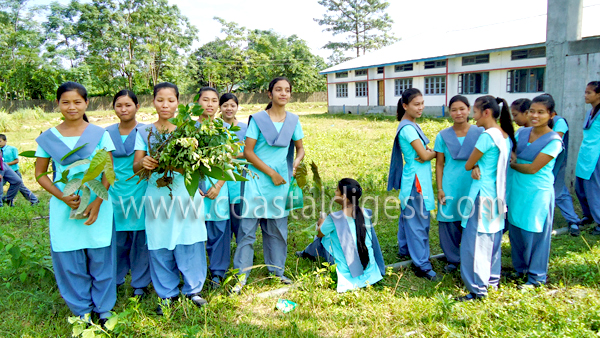There are several reasons why I chose to travel all the way to a remote village in eastern Arunachal Pradesh to volunteer as a teacher in a private school, but a positive appreciation of the value of formal schooling is certainly not one of them. The more time I spend with my students, the more confirmed I seem to be growing in my conviction that the formal schooling system is seriously flawed. Almost every child in the area is enrolled in school, although how much they learn is an entirely different matter. And so is the question of whether much of what they do learn will be of any use to them in their lives.
Knowledge, as many of my students see it, is restricted to the contents of their textbooks. Their perception of education is limited to whatever is taught within the classroom. Knowledge and experiences that can be gained outside their textbooks and beyond their classrooms are not considered to be ‘real’ education, for these count for nothing at all in terms of performance in one’s examinations, passing which is seen as the aim of schooling. That is one reason why almost none of my students, even senior students studying in the tenth grade, cares to read newspapers, magazines or story books. In almost all cases, all that my students read—if they read anything at all—are just their textbooks. And this definitely isn’t because they find their textbooks fascinating. Rather, it is simply because in order to pass their examinations and be promoted to the next grade this is what they have to do. Studying (in most cases, memorizing) their textbooks is a necessary torture they have to suffer if they are not to fail in their examinations.

Many of my students see education as simply a means to get a certificate that will enable them to enroll in a college and then get a job in the city, which can rescue them from the back-breaking drudgery of village life. And that is why most of my students simply don’t feel the need to read beyond their textbooks. They know that knowledge other than that contained in their textbooks will be of no use in their performance in their examinations. This is because their examinations are based simply on their understanding or memorization of the contents of their textbooks. This explains why many students regard reading anything but their textbooks as a waste of their time, which they’d rather spend playing or loitering around or watching TV—Bollywood trash, silly soap operas and violent American movies, particularly.
It isn’t entirely the students’ fault if they think that way. The formal educational system is also to be blamed for this, in part. The dictatorial style of teaching in schools as well as a curriculum that is not at all attuned to local cultural contexts suffocate the children’s natural curiosity to learn and stifle any interest they might otherwise have had to read anything beyond their textbooks. ‘Schooling is made so boring and fear-driven for kids that they simply lose interest in reading anything more than the minimum they have to in order to pass their examinations,’ said a man to me the other day who had started a bookshop in a nearby village in the hope of promoting the reading habit among village children but had to shut it down soon after because he got almost no customers. ‘Many children regard reading as a torture that they are compelled to tolerate at school, and that’s why my bookshop didn’t work. They don’t want to read anything more than whatever they have to in order to pass their exams.’
The schools in this area are almost all affiliated to the Central Board of Secondary Education (CBSE). The CBSE syllabus is common throughout the country, being followed by all schools affiliated to the CBSE. Students from across the country are thus presented with a uniform and homogenized package of information in the name of education, which they are expected to learn/memorise in order to pass from one grade to the next. Naturally, a highly centralized system of education of this sort cannot accommodate local forms of knowledge. Such forms of knowledge are implicitly regarded as being of lesser worth—they merit not so much as even a passing mention in the textbooks—and so, expertise in them counts for nothing in terms of examination performance or in getting a job. As a result of this hierarchy of forms of knowledge, local knowledge systems are under increasing threat.
There are numerous ethnic communities in the area where I work, each with its distinct language, traditions, dress, and culture. Till recently, almost every girl knew how to weave exquisite homemade cloth (each tribe had its own colour combations and designs), but this skill is of no use in terms of passing one’s examinations. Nor, too, are other local skills, such as making baskets, cultivating steep mountain slopes, using jungle herbs to cure various ailments, and so on, which, traditionally, almost every boy and girl learnt, well before they entered adolescence. Some of my students can build an entire house out of bamboo and leaves in a week, and can design farming implements, too. But such amazing skills are of no value at all as far as the formal education system is concerned. All that matters is one’s ability to manipulate or memorise the contents of textbooks that reflect a form of knowledge that has little or no connection with the lived realities of village children. And so, one can expect that in a few generations, local knowledge systems in this region, and, along with them, local cultures and skills, will crumble and perhaps disappear or else will be disfigured beyond recognition, as has happened elsewhere in India where the hegemony of the ‘modern’, centralized and homogenizing formal system education has become firmly established.

In contrast to the formal education system, the traditional forms of knowledge of the inhabitants of this area were practical and intimately related to their everyday needs. Since the formal educational system seeks to cater to students across the country, it cannot take into account local needs. Since it is based on bookish learning, it cannot cater to local people’s practical concerns. Hence it is largely irrelevant, other than as simply a means to gain admission to college and as a necessary passport for a job outside the village. It provides rural students with few practical skills that they might find useful. No wonder, then, that schooling is seen by many as drab and boring, an imposition that children feel they are forced to suffer.
But things need not necessarily be this way. With just a little imagination and effort, they could be very different. If education were decentralized and adjusted to local needs in different parts of India, it may no longer be regarded by village children as a necessary torture to be suffered in order to get a job, but as practically useful to rural folk, too, helping them enhance the quality of their lives. Knowledge of local diseases and their cures, for instance, could be imparted to children, as could basic first aid. Children could be taught about more cost-effective methods of growing local crops, or ways to replenish their environment, which, in the part of Arunachal Pradesh where I now am, is now under serious threat due to rampant deforestation. They could learn about various government programmes meant for village development and about how to set up NGOs to improve village life. There could be skill enhancement courses in schools to promote local crafts, and students could learn about product designing and marketing techniques. Local music, art and dance forms as well as tribal languages and dialects could be rescued from extinction if they are taught in and encouraged by schools. And so on.
All of this would make education much more relevant to children and certainly more intimately related to their lives than the present system, which has reduced learning to a dull regime that children have to submit to if they dare to dream of a job outside the village. And then schooling would certainly also be fun and exciting, no longer a burdensome torture, as it indeed is for many of the children whom I teach.







Comments
Add new comment